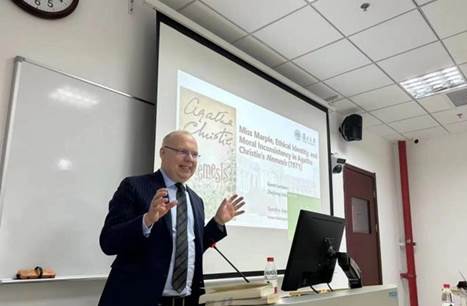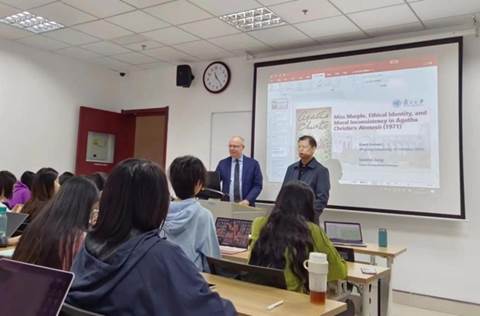On October 12, the 11th “Leading Lectures on Frontier Studies” of Zijingang Global Forum on Interdisciplinary Studies 2023, hosted by the Institute for Interdisciplinary Studies of World Literature of Zhejiang University, was held on Zijingang Campus.
Prof. Sandro Jung, editor-in-chief of Asian Network for Quality (ANQ), A quarterly journal of short articles, notes and reviews, director of the Center for Text and Cultural Studies at Fudan University, and Fudan Distinguished Professor of English and Comparative Literature, delivered a lecture entitled “Miss Marple, Ethical Identity, and Moral Inconsistency in Agatha Christine’s Nemesis(1971) and A Caribbean Mystery (1964)”. The lecture was moderated by Prof. YANG Gexin of the Institute, with the participation of undergraduate and graduate students from the School of International Studies of ZJU.
In the lecture, Prof. Sandro Jung focused on Miss Marple, a detective character created by Agatha Christie, and explained her ethical identity and moral contradictions based on a close reading of A Caribbean Mystery and Nemesis. In numerous film adaptations and literary analyses, Miss Marple is regarded as a model of virtue, calmness, intelligence, and perception, and a detective who always relies on her intuition and wit to solve mysteries at critical moments. However, Prof. Sandro Jung believed that this is a misreading of the character. Applying the method of ethical literary criticism, Prof. Sandro Jung re-examined Miss Marple’s ethical identity and moral contradictions by analyzing the linguistic details and her inner monologues in the novel, asserting that the strategy she employed to uncover the truth in tracking down the criminal is morally questionable.

First of all, Miss Marple resorted to disguise and deception to solve the case. For example, at the beginning of Nemesis, Miss Marple described herself as “an elderly, rather scatty, quite ordinary person, physically not strong, mentally not nearly as alert as she used to be”. Prof. Sandro Jung claimed that this seemingly modest self-description is Miss Marple’s way of disguise. By portraying herself as a kind, harmless old lady, she was able to make others, including the murderer, lower their guards, so that she could gather more information. In addition, Prof. Sandro Jung highlighted that the term “Old Pussy” appears 189 times throughout the novel, a subtle nod from Miss Marple that she posed no threat. However, she was a formidable foe to criminals and those harboring secrets. Miss Marple’s disguise and deception just seemed to be a tactic for detectives to solve the case, but her actions clashed with the Victorian moral codes advocated by herself, given that she was not a professional detective.
Secondly, during the cases, Miss Marple usually relied on her intuition and first impressions to judge whether a person was innocent or not. This method was questionable in rationality. Through an inter-textual interpretation of Nemesis and Christie’s other novels, Prof. Sandro Jung pointed out that Miss Marple employed analogy and type casting to classify the people around her, and on this basis deduced their motives and possibility of committing crimes. In Nemesis, for example, Miss Marple, at first sight of Clotilde, connected her with the husband killer Clytemnestra in Agamemnon, and therefore speculated about the possibility of her committing murder. Prof. Sandro Jung then asserted that Miss Marple judged what kind of person a man was based on her first impressions rather than a deep understanding and applied these superficial and biased subjective judgments to solve cases, the rationality of which is questionable.
Finally, Prof. Sandro Jung, with the unreliable narration of the novel, explored Miss Marple’s “ruthlessness” in her quest for truth. For example, when the case in Nemesis came to an end, Miss Marple reflected on whether she had a chance to stop Clotilde’s suicide and gave a negative answer. Prof. Sandro Jung noted, however, that we should be wary of the unreliability of Miss Marple’s account, and that Miss Marple’s reflection on the case implied that she actually did nothing when she could have prevented the murderer’s suicide. Her inaction was in fact her ethical choice, indicating her support for the capital punishment of the murderer. However, either as a professional detective or not, Miss Marple had no right to impose legal sanctions on the murderer, and her behavior was not only a transgression of the law but also a violation of the moral codes she advocated, showcasing her moral contradictions.

In the discussion session, the students exchanged ideas with Prof. Sandro Jung on the ethical choices of Poirot, another detective in Christie’s works, and the similarities and differences between the ethical dilemmas faced by professional and non-professional detectives. Prof. YANG Gexin concluded that Prof. Sandro Jung’s lecture provided us with an example of interpreting texts with literary ethical criticism, and that in literary criticism, we should not only do a close reading of texts to support our arguments with “evidence” from texts, but hold a dialectical attitude towards the ethics of the characters in the works. In the end, Prof. YANG Gexin and the students expressed their sincere gratitude to Prof. Sandro Jung.
The lecture is supported by the major project of the National Social Science Fund “Collation, Translation and Research of Contemporary Western Ethical Criticism Literature” [Project No. 19ZDA292].
“Zijingang Global Forum on Interdisciplinary Studies”, named after Zijingang Campus, the main campus of Zhejiang University, aims to provide an interdisciplinary platform for scholars engaged in humanities at home and abroad, especially those who are devoted to literary studies, to facilitate theoretical advancement, methodological innovation, intellectual promotion, and information exchange. As a foundational part of the Institute for Interdisciplinary Studies of World Literature, “Zijingang Global Forum on Interdisciplinary Studies” launches a series of academic activities and keeps its participants informed about current scholarship in the field. To be more specific, it consists of four major forums: “Leading Lecture Series on Frontier Studies”, “Leading Publication of Academic Achievements”, “Leading Forum on Interdisciplinary Studies for Young Scholars”, and “Leading Forum for University Students”.
Text/Photos: SHI Yinan, LI Ziru
Institute for Interdisciplinary Studies of World Literature, Zhejiang University
October 12, 2023
Translated by: CHEN Yuqing and ZHANG Xiaoran, Proofread by XU Xueying



